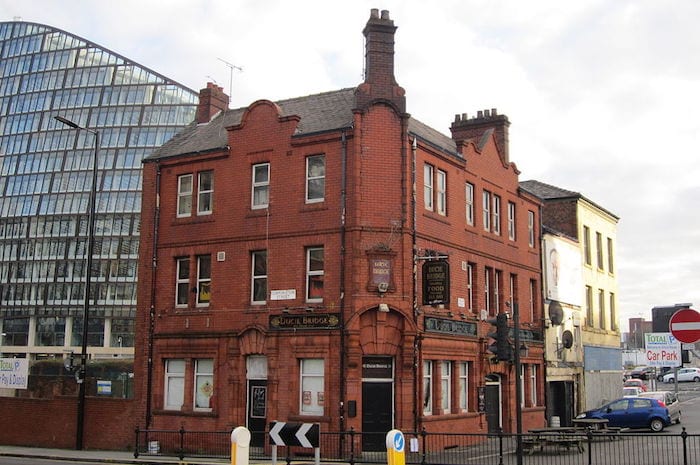Thousands of people sign petition to save Manchester pub threatened with demolition
- Written by Ray King
- Last updated 7 years ago
- City of Manchester, Community, Sport

Grassroots heritage lobby group Manchester Shield has launched a last ditch public plea to rescue the Ducie Bridge pub from the wrecking ball after more than 3,150 people signed a petition to save it in just 10 days.
The iconic Victorian pub on the corner of Corporation Street and Miller Street dates back to 1892 and in recent years provided a stage for scores of up and coming bands and musicians before its owners, the Co-operative Group, forced its closure in 2015.
Manchester Shield insists that developers and local politicians need to value the talent and opinions of local people in genuine consultations regarding the built environment in central Manchester.
“People are left incredulous that this building, used as a live music venue until so recently, is now said to be beyond ‘tipping point’”, said Manchester Shield spokesman Adam Prince.
“The claim that the Ducie Bridge is so structurally unsound that the only solution is an application for demolition is frankly ridiculous. Who exactly says so? We have made an application to Historic England for them to considering listing the pub.”
Adam claims that the young squatters who were evicted from the Ducie Bridge last autumn after the developers of NOMA – the Co-operative Group’s huge headquarters – obtained a court order, have confirmed that the building is in good condition. According to them, the pub was one of the best they had occupied as homeless activists seeking refuge in empty buildings.
“When the venue closed in August 2015, surely if the premises were indeed this unsound, they would not have been licensed,” Adam said.
“The tactic of claiming heritage buildings, deemed to be in the way of corporate development, are beyond saving is all too common. The Ducie Bridge may just be one old pub, but there’s a war of attrition going on building by building, and it all adds up, over time, to be the piecemeal death of the city’s heritage.”
“Manchester Shield will also be seeking to list other buildings in the city. We would hope that instead of a demolition ‘rush’ for a car park, a cooling off period and further consultation will follow.
In 2011, the Crown and Cushion pub, also on Corporation Street, closed its doors after its owners sold the building to the Co-operative Group. It was then flattened to make room for the redevelopment of the £1billion Co-op Quarter. The pub occupied the site of the Crown, one of Manchester’s oldest inns, dating from 1741.
NOMA aims to transform the area north of Victoria Station into a 20-acre complex with shops, offices and public squares, eventually providing up to 10,000 jobs.
Nearby Unicol House, striking former home of the United Yeast Company in Miller Street, was demolished seven years ago and the site is now a car park. Manchester Shield fears that the Ducie Bridge will suffer the same fate.
“To claim that the Ducie Bridge is beyond saving is in stark contrast with what happened to the Welsh Baptist Chapel on Upper Brook Street which spent years on the at risk register but was rescued and redeveloped,” said Adam.
“We believe that citizens’ voices in shaping Manchester really do matter. Engagement, collaboration and advocating the civic voice in planning can and must be vastly improved. So we were particularly disturbed that, after speaking to NOMA and their public relations departments, they angrily called us for having reported a précis of the conversation on social media.
“Yet they had offered no clarity on the alleged structural damage, nothing about costs of repairs or why the Ducie Bridge needs to be demolished. We made it very clear to them that we don’t do closed-door conversations, especially as campaigners for a building.
“Our concerns are about the constant erosion of heritage assets, the character of the streets and the memories of places people have been. It is also symbolic of the planning process and flawed consultations that seek to profit the few, whilst excluding the many.”
He added: “This petition shows an incredible impetus to do better in planning and consultation across the city. The Ducie Bridge could survive, if NOMA were not seeking to profit over a small Victorian building, beloved by many.”
- This article was last updated 7 years ago.
- It was first published on 25 October 2017 and is subject to be updated from time to time. Please refresh or return to see the latest version.
Did we miss something? Let us know: [email protected]
Want to be the first to receive all the latest news stories, what’s on and events from the heart of Manchester? Sign up here.
Manchester is a successful city, but many people suffer. I Love Manchester helps raise awareness and funds to help improve the lives and prospects of people across Greater Manchester – and we can’t do it without your help. So please support us with what you can so we can continue to spread the love. Thank you in advance!
An email you’ll love. Subscribe to our newsletter to get the latest news stories delivered direct to your inbox.
Got a story worth sharing?
What’s the story? We are all ears when it comes to positive news and inspiring stories. You can send story ideas to [email protected]
While we can’t guarantee to publish everything, we will always consider any enquiry or idea that promotes:
- Independent new openings
- Human interest
- Not-for-profit organisations
- Community Interest Companies (CiCs) and projects
- Charities and charitable initiatives
- Affordability and offers saving people over 20%
For anything else, don’t hesitate to get in touch with us about advertorials (from £350+VAT) and advertising opportunities: [email protected]

The very special toy shop where parents don’t pay a penny is open – and busier than ever

Manchester’s oldest homelessness charity celebrates 40 years of supporting the needy

Games, science and history collide at Manchester’s Science and Industry Museum this winter

Best bars and pubs to watch the football and live sport in Manchester

How Baguley Hall Primary School is nourishing minds with a morning Magic Breakfast














